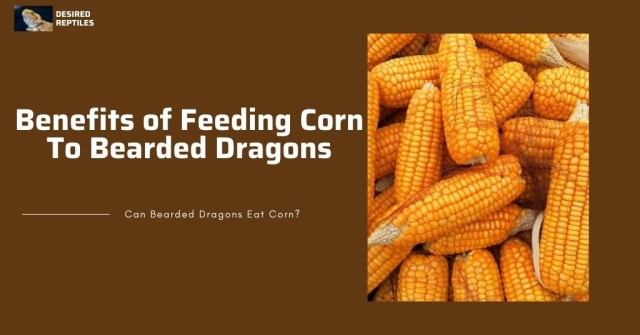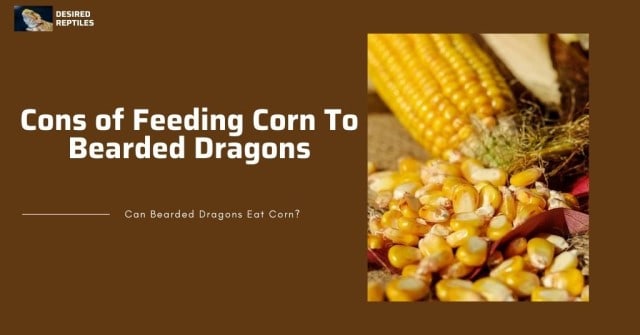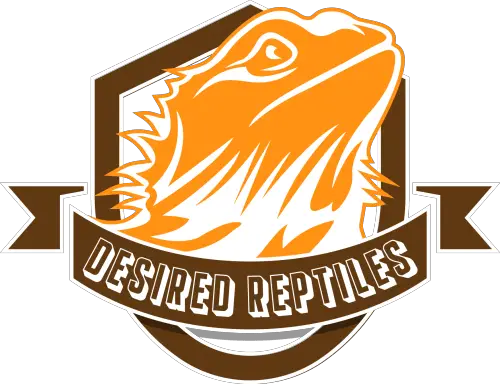There are several plant-based foods that bearded dragons can eat safely, and even thrice the amount that is dangerous for them to consume. Not every diet that is healthy for you would have the same effects on your pet eating it. Some plant-based foods could contain items that may be outrightly toxic to beardies or may have little value so much that they make a nutrient loss from eating them. Bearded dragons need to eat vegetables rich in nutrients as much as possible to ensure they grow and remain healthy through all the stages of their development.
Bearded dragons can eat corn occasionally. It is classified as a low-value food and is not required as a dietary item for beardies. If fed without care, it will cause health problems for your pet due to the high level of starch in it.
In this discussion, we’d be analyzing corn and the pros and cons of feeding it to your bearded dragon so that you don’t put your pet in danger. Let’s go!
Is It Safe To Feed My Bearded Dragon Corn? – Nutritional Values Of Corn
Bearded dragons can eat corn in the right amount even if they don’t necessarily need to. As long as you keep it as a treat and feed it once in a while, you and your dragon might enjoy the ordeal. You must understand that bearded dragons have different preferences, and it’s possible for your beardie to absolutely hate corn. If your pet visibly winces at the taste of the grain, don’t force it to eat anymore. There are several other treats, such as fruits, flowers, herbs, and even some vegetables, that your beardie can enjoy instead.
Before you choose to feed your pet any delicacy, you must be aware of the nutritional value it contains. Beardies are fast-metabolism creatures that require nutrients to be replaced as they are used up relative to their size.
Here are the approximate nutritional values of corn according to the USDA per 100 grams:
- Calories: 96
- Carbohydrates: 19 grams
- Protein: 3.4 grams
- Fat: 1.2 grams
- Fiber: 3.6 grams
- Sugar: 3.2 grams
- Vitamin C: 6.8 mg (11% of the Daily Value)
- Thiamin (vitamin B1): 0.2 mg (13% of the Daily Value)
- Niacin (vitamin B3): 1.8 mg (9% of the Daily Value)
- Folate (vitamin B9): 42 mcg (11% of the Daily Value)
- Iron: 0.5 mg (3% of the Daily Value)
- Magnesium: 37 mg (9% of the Daily Value)
- Potassium: 270 mg (8% of the Daily Value)
- The phosphorus and calcium ratio: 1:45
The nutritional value of corn will vary depending on the type of corn and the way it is processed. Dry corn has a higher amount of starch than any other presentation of corn and is the most dangerous to your bearded dragon.
Sweet corn is certainly too sweet for beardies to eat more than twice a week, but is much safer than dry corn.
How To “Safely” Feed Your Bearded Dragon Corn
Corn should be fed to bearded dragons sparingly. Your beardie should eat nothing more than a few kernels twice a week for its safety. You can include corn in your pet’s salad as a topping or feed it as a treat during your free time, but it must never exceed 10% of the daily salad.
If your beardie enjoys corn, you can use it to bond better with your pet or help it to relax if it’s stressed. The quantity of how much salad your beardie should eat will depend on your pet’s age. Once you know the volume of the salad your beardie requires, you can easily measure how much corn you should feed to your pet at maximum.
The table below will give you a practical view of the quantity of salad you should feed your pet depending on its age:
| Age (months) | Percentage |
|---|---|
| 0 – 2 (Baby stage) | 30% greens, 70% grubs |
| 3 – 6 (Juvenile stage) | 30% greens, 70% grubs |
| 6 – 9 (Subadult stage) | 40% greens, 60% grubs |
| 9 – 18+ (Adult stage) | 70% greens, 30% grubs |
Should I Feed My Beardie Cooked Or Raw Corn?
Raw corn is much more difficult to digest and will contain higher levels of starch. Although cooked corn has less nutritional value since the vitamins have been watered down, they happen to be much safer than raw corn for bearded dragons.
Sometimes, the corn even cooked will be seemingly tough to chew. When you notice this, try to squash it between your thumb and index finger or with a spoon to help crush it down a bit. Be careful not to turn it into mush; you don’t want your pet to be uninterested. This would encourage your beardie to eat and digest the corn safely without choking or getting impacted.

3 Surprising Benefits Of Corn To Bearded Dragons
There are of course benefits of serving corn to your bearded dragon, even though it’s a treat. As long as you’re feeding corn to your pet correctly, it should make benefits in the following ways:
Corn Is An Energy-Giving Food
Corn is a major carbohydrate and is a great energy source for bearded dragons to enjoy. Beardies can synthesize glucose from corn that can generate a boost of energy for the given timeframe. Coupled with the fact that it’s a sweet snack, your pet would appreciate the extra boost.
The Fiber In Corn Is Good For Digestion
Fiber is highly essential for the digestive health of your bearded dragon. Most of the vegetables that are good for them are high in fiber. Fibrous food provides the bulk load needed for proper excretion, it slows down digestion, and allows more effective absorption of nutrients through the process. Thus, every nutrient the meal brings is fully consumed and maximally utilized. Feeding your beardie corn is good for its health!
Corn Is A Great Source Of Minerals And Vitamins
Even as a treat, corn is loaded with vitamins and minerals that are essential for bearded dragons. You have vitamins C and B which are great antioxidants and immunity boosters, and minerals like potassium and magnesium that are great for the heart and neurological health. Packed with all these benefits, corn will make great toppings for your beardie’s salad.

The 3 Major Dangers Of Feeding Corn To Bearded Dragons
Corn is somewhat of a controversial food to feed bearded dragons. It’s strictly a treat, and not exactly the best kind at that. While they do have benefits, as the majority of plant-based foods would have, they are not great choices for beardies. This brings us to the 3 dangers of feeding corn to your beardie:
Your Beardie Can Develop Impaction
Corn is a rather chewy food to eat. You would need a good few seconds of chewing before you can eat it comfortably. Unfortunately, bearded dragons are not equipped with the proper dentition to crush corn or digest it suitably. Coupled with the fact that corn is fibrous, your beardie could develop serious impaction from this that could lead to further complications.
Your Pet Is At Risk Of A Bone Disease
The calcium and phosphorus ratio is a very detrimental part of your bearded dragon’s diet. While phosphorus plays a role in calcium metabolism, it could be highly notorious in excess. The ratio of phosphorus to calcium in corn is 1:4 as compared to the standard 1:1. Phosphorus binds to calcium causing a shortage of calcium if the phosphorus is more in amount. This rather seemingly minor problem could lead to a metabolic bone disease that is fatal depending on the severity.
Your Pet Can Grow Obese
Corn is way too starchy for bearded dragons to eat regularly and, too much carbohydrates contribute to the development of obesity. Bearded dragons do not have the ability to break down starch the way we humans do, and so, they have a much higher tendency of growing excess fat as a result. They also are not active enough as captive pets, so burning carbs would be a slower process than they require to stay fit.
Quick Facts – Pros And Cons Of Feeding Corn To Beardies:
| Pros | Cons |
|---|---|
| Great source of energy | Can lead to impaction for your pet |
| Contains fiber which aids in digestion | Is an avenue for metabolic bone disease |
| Your pet can benefit from the minerals and vitamins | It’s easy for your pet to grow obese from corn |
Can Bearded Dragons Eat Popcorn?
Bearded dragons should not be eating popcorn as they’re not evolved to digest it. Popcorn is basically a dried and roasted version of corn; it becomes much more chaff-like and difficult for beardies to even eat without choking and could lead to impaction. Also, popcorn is usually made with other ingredients like sugar and butter which is unsafe for beardies to consume.
5 High-Carb Foods You Can Feed Your Beardie (Safer Alternatives)
Sweet Potato
Sweet potato is a great source of energy for beardies. They contain beneficial carbohydrates and have a much better phosphorus-to-calcium ratio. Your beardie can eat sweet potato raw or cooked, but they have to eat it occasionally.
Yams
Similar to sweet potatoes, yams are also great sources of carbohydrates. Beardies can eat yams cooked and served as treats alongside their veggies.
Butternut squash
Butternut squash is a great high-carb veggie to feed beardies and one of the few they can eat every day. It’s very good for their dental health and is packed with a punch of vitamins that is essential for their health.
Pumpkin
Another great fiber and carb source are pumpkins. They are heavily saturated with vitamin A and potassium which are great for the cell development of beardies.
Green beans
Green beans are also vegetable snacks that your beardie can enjoy. Just ensure you feed it to your pet moderately so that they don’t fall sick from the phosphorus and calcium content.
